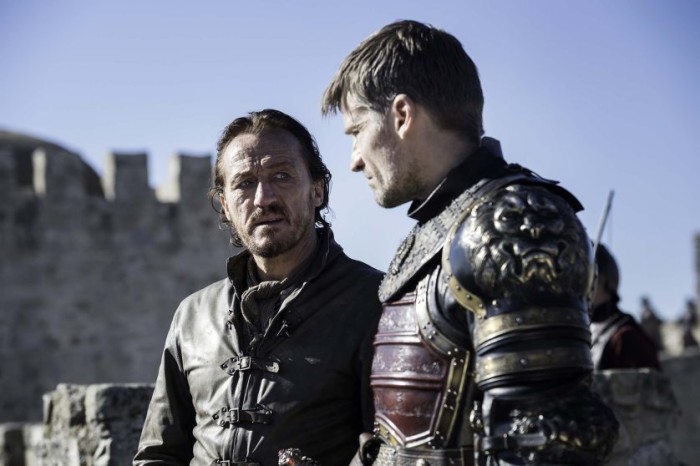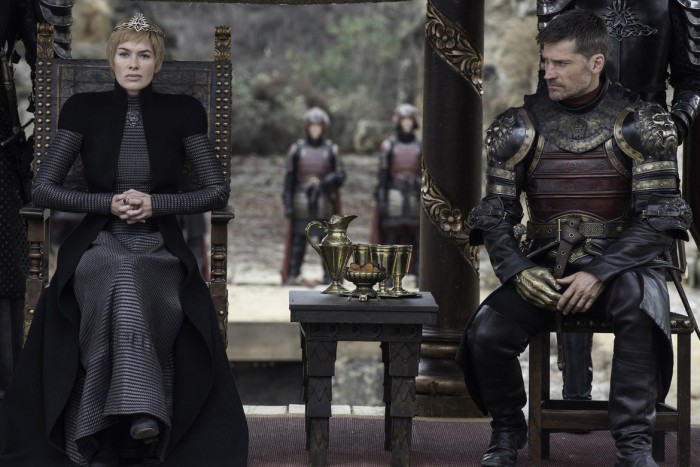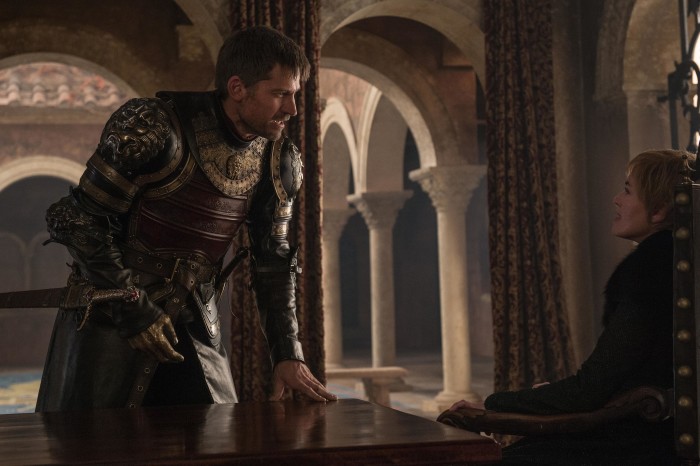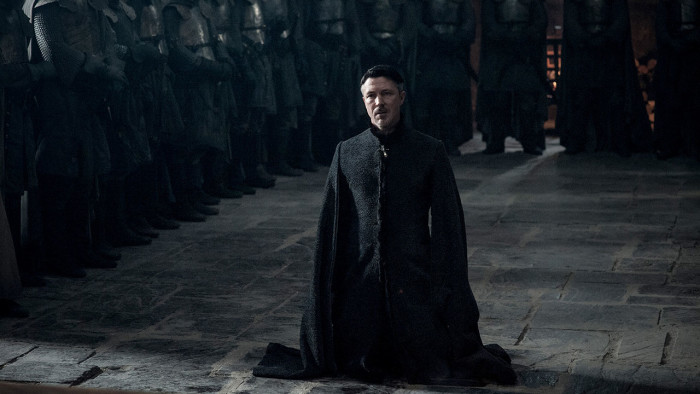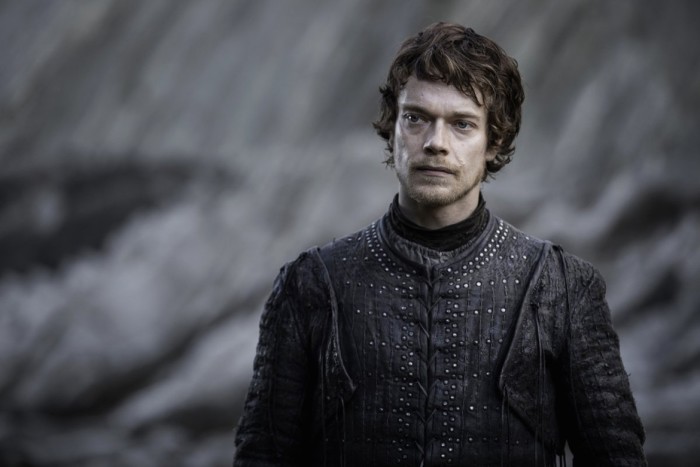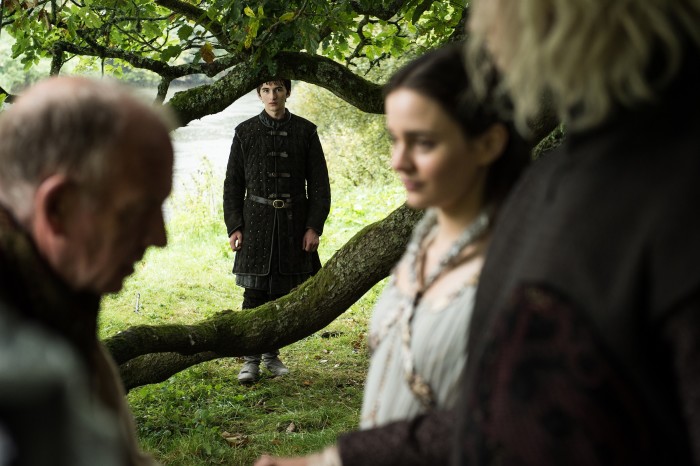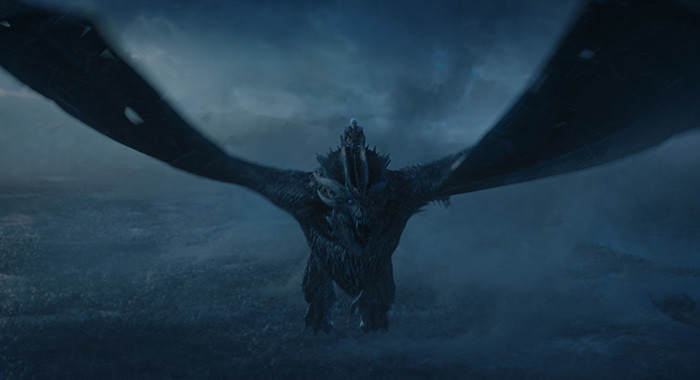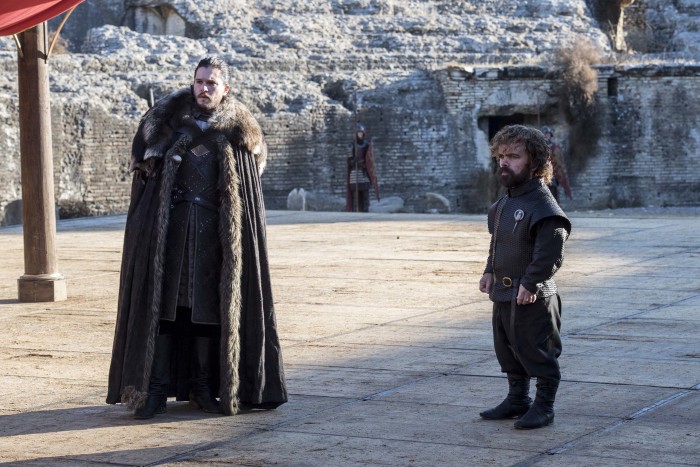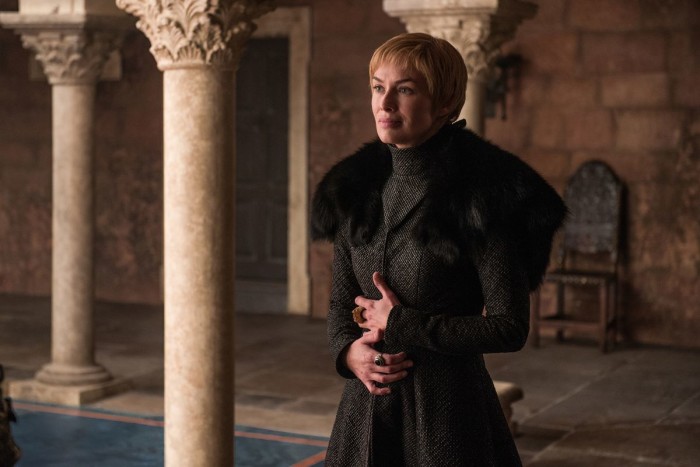'Game Of Thrones' Review: 'The Dragon And The Wolf' Ends An Uneven Season On A High Note
(In our coverage of Game of Thrones season 7, we'll be examining each episode with one simple question in mind – which character is winning the game of thrones this week?)
And like that, Game of Thrones season 7 has come to an end. Who has survived? What's left of them? Where do they go from here? And, most importantly, who's "winning" the game of thrones? All very important questions. Let's dive in.
The Former Sellsword and His Many Friends
Before we dive into the meat of "The Dragon and the Wolf," let's pause to appreciate Ser Bronn of the Blackwater, formerly just Bronn. The scumbag sellsword turned halfway-respectable knight has been one of Game of Thrones' most consistent pleasures, with actor Jerome Flynn transforming what should have been a temporary side character into one of the most memorable supporting acts in Westeros. It's telling that Bronn no longer has a major role in the novels while he continues to hang around the key players on the show – to not utilize Flynn would be a travesty.
One of these days, I may get around to writing about what the books do better than the show and how the show has improved the books. Samwell Tarly, unbearable on the page, is wonderful on the screen. House Martell, a clan of devious badasses on the page, represents a low-point for the series. But Bronn may be the finest step up from the source material and the best example of the show recognizing a good thing and pivoting hard to ensure that this good thing stays in the show as long as possible, even beyond his time in the books.
This was reflected in the early scenes of "The Dragon and the Wolf," where the two sides of the big war head to their big meeting in the crumbling dragon pit. Bronn is the lubrication that keeps these early conversations running: here's a guy who has proven himself a valuable ally to Tyrion Lannister, Jaime Lannister, and Podrick Payne over the years. Somehow, the scoundrel has played every side and remained in the (somewhat) good graces of them all. Chalk it up to charm. Or perhaps more accurately, chalk it up to honesty. Jon Snow may get the dunderheaded "I cannot tell a lie" moment of the episode, but Bronn embodies a similar world view, albeit far more practically. He'll stab you in the back, but he won't lie to your face. And you have to admire that. Appreciate it, even.
As the nobles and the queens and the kings battle it out, Bronn is the perspective we so desperately crave: the normal everyman who just wants to survive, the guy who skips the big dramatic meeting to get a drink with Podrick because the best way to stay alive is to not care too much. When the dust clears at the end of the war, I fully expect Bronn to be one of the few people left standing.
The Lion and the Wight
Despite its wonky timeline and faster pacing, Game of Thrones season 7 still followed the pattern established by previous seasons. The penultimate episode is the showstopper, the giant battle or major event that changes the game in a major way (the death of Ned Stark, the Battle of the Blackwater, the Red Wedding, the Battle of the Wall, the Battle of the Bastards, the Night King gets a dragon) and the finale is the exhalation of breath after the final swing of the sword, the calm before the next storm. Season finales are a time to look at the pieces remaining on the board and take stock of who's still breathing and where everyone is going.
But with the final season coming next year, "The Dragon and the Wolf" has more table setting to do than usual. It has to move everyone into place for the final stretch. It has a lot to accomplish and a generous 80-minute running time to get it done.
But it's telling that the centerpiece sequence of this episode was so much more thrilling than the far larger and more technically complex climax of "Beyond the Wall." Sure, Game of Thrones has grown lavish enough to deliver impressive spectacle, but there's still nothing quite like an intense meeting between disparate characters, conversations filled with thinly veiled threats, and truces built on the shakiest possible foundations. Game of Thrones has become more willing to embrace traditional fantasy as it's gone on – by design, as this is a story of all-too-human foibles blinding people to the very traditional fantasy villain marching toward them – but it's still at its strongest when it puts a bunch of characters in one place and just lets them talk.
And this conversation (this long, long conversation) is about one thing: convincing Queen Cersei Lannister that the army of the dead is real by presenting her with an actual wight, proof that zombies exist and they're coming along with the winds of winter. Watch Lena Headey's performance during these scenes – she barely bats an eye when Daenerys arrives in style on the back of Drogon, but she allows a rare look of shock and surprise when that shambling corpse lunges at her. It's only a flash (Cersei is nothing if not a fine poker player), but I'm reminded of when Bronn and Jaime found themselves literally under fire from a dragon. Seeing the most unshakable characters on Game of Thrones actually shake is as powerful as an expensive battle sequence.
Of course, there are a myriad of joys to be found in this scene. The brothers Clegane, meeting again. Brienne and the Hound, bonding over their mutual affection for Arya. Euron Greyjoy's ridiculous power move that opens the armistice talks. Tyrion's frustration at Jon Snow's refusal to lie. Qyburn's fascination with the wight's severed hand. These people hate each other, but here they are, all in one room, all just talking. And while they all hail from different backgrounds, they all have one thing in common – they've all survived this long on Game of Thrones. And now they're here. And they have to work together or die. Now that's good television.
The Lion and the Lion...and the Lion
Let's address the lion in the room: is Queen Cersei the smartest person in Westeros or the most foolish? She's as stubborn as a Stark, but...bendable? Or greasy? Or whatever adjective you want to use to describe someone who refuses to change and will contort themselves into any shape to maintain their basic chemistry. If Jon Snow is a brick wall, Cersei Lannister is silly putty.
So it's not surprising that the ever-devious Queen of the Seven Kingdoms was playing the long game throughout the entire truce talks. Just when you think Cersei is ready to admit that there exists something more important than House Lannister, she reveals her real plan. She's not sending her armies to the north. She's not going to offer any aid. She's going to sit back and wait out the storm and deal with whatever remains. And in a twisted way, her logic checks out. She notes that Daenerys is down a dragon – something has gone wrong for her seemingly unbeatable enemy. So why not let the two opposing forces smash into each other so she can stomp on the shards? Especially since she can afford to ship over 20,000 fresh mercenaries from Essos.
While Cersei is her usual icy self during the public talks, it's her scenes in private that truly reveal the human being beneath that slick black dress and that unbendable exterior. When faced with Tyrion, the brother who killed their father and "killed" their mother, you see the armor slip away to reveal the proud, spurned daughter. This wounded Cersei, the one forced into a marriage with Robert Baratheon, the one forced to march naked through the streets of King's Landing, the one whose battle against a vile patriarchy transformed her into an admirable monster whose selfishness comes from a place of wanting to break the same wheel Daenerys is always talking about, is how we can stomach her. Understand her, even. The Night King will always be a little boring (he's a generic fantasy villain wading into a more complex web), but Cersei Lannister is an all-timer of a bad guy: each piece of her vile personality is a weapon initially constructed for self-defense. To see her reunite with her hated younger brother, to see their attempt to reconcile, is a reminder of this.
Of course, Tyrion only survives their conversation because she's playing the long game and needs him to return alive so she can send her enemies up zombie creek without a Lannister army. But Tyrion is one of the few characters on Game of Thrones capable of cracking open its greatest villain and letting us see what makes her tick. At this point in the series, it's a painful reminder. Cersei is a survivor, first and foremost. And the world has taught her to only care about herself and her blood.
But there is one other person in Westeros capable of bringing out the Cersei hidden from public view: her general/brother/lover Jaime. And in "The Dragon and the Wolf," he finally revealed the breaking point of her ruthlessness.
Jaime has been flirting with nobility since before the events of the show began. He only earned the title of "Kingslayer" because he wanted to save the population of King's Landing from the Mad King. He turned back to save Brienne from the bear pit even though it benefited him in no way. There's been a slowly growing stain on Jaime Lannister ever since he lost his sword hand back in season 3, ever since he realized that his accomplishments wouldn't even fill a single page in that record of the Kingsguard – a stain of dissatisfaction and inner turmoil and the desire to go against his very nature and be better. Liking Jaime Lannister is a difficult task, but that's always been a specialty of Game of Thrones. Like his sister, Jaime is human enough to make his monstrous qualities all the more upsetting. His slow turn toward nobility, his moments of genuine decency, suggest that he's capable of changing in a way that his sister never will be.
And that brings us to one of the biggest moments in "The Dragon and the Wolf," one that will be overshadowed by the events surrounding it. Jaime Lannister has abandoned his Queen, his sister, his lover, to ride north with Daenerys and Jon to fight the Night King. This is the Jaime Lannister who pushed Bran out of a tower and killed his cousin. But this is also the Jaime Lannister who knew, years and years ago, that stabbing his King in the back was worth it if it meant saving a million lives from a madman with a wildfire collection. And Cersei letting him go, leashing the Mountain instead of letting him chop her treasonous brother down, exposes her own breaking point, her own limits. The things we do for love.
Jaime Lannister is riding toward a war, but he's also riding toward some kind of redemption. Whether he can even hope to find it is a question for season 8.
The Wolves and the Mockingbird
R.I.P. Petyr "Littlefinger" Baelish. You son of a bitch.
In my years of writing about Game of Thrones, I have often noted that I expected Littlefinger to survive to the bitter end. Here is a man who fights for nothing and no one, existing only to climb the ladder of power as his enemies (and supposed friends) burn below him. In a continent full of wily and cunning snakes, he was the slipperiest and the smartest. He was always too useful to kill, too good at hiding his tracks, and too persuasive to let himself get caught in any kind of bind. He was Game of Thrones in a nutshell. The ultimate player, perhaps rivaled only by Varys (who was eternally hobbled by his desire to, you know, ultimately do the right thing).
So it's only fitting that Littlefinger died at the hands of a family he's screwed over one too many times. And it's even more fitting that he died because one of his seemingly foolproof schemes went haywire and exploded right in his face. He can turn entire kingdoms against each other, start wars between noble houses, and turn empires into dust...but drive a wedge between the Stark sisters? Throat, meet Valyrian steel blade – an echo of Catelyn Stark's death at the Red Wedding. How fitting.
It turns out that Arya and Sansa Stark aren't stupid and that they weren't playing right into Littlefinger's hands – they were just beating him at his own game. What looked like shoddy writing in the moment reveals itself to be characters who were speaking in code and playing their cards very close to the vest. Is it unclear and never explained in truly satisfying way? Yeah. Was it all worthwhile to see Littlefinger get taken down by the young women whose lives has been utterly destroyed by his actions? With the blade he once gave an assassin to murder their brother with, no less? Yeah. Of course. Game of Thrones season 7 has been all about supremely satisfying payoffs built on a sometimes rickety foundation, so why should the death of Littlefinger be any different?
While his death was quick (probably quicker than he deserved), the scene leading up to it was an opportunity for Aidan Gillen, one of the weirdest actors in all of Game of Thrones, to go full-Littlefinger. There's his suave denial. There's his request to talk this over in private. There's his attempted show of military force. And then there's him literally falling to knees to flat-out beg for his life. Watching this master strategist, who always plays the long game from afar, fail as a tactician in the moment is both thrilling and grueling. We watch the entire Petyr Baelish playbook get trotted out, only for each tactic to fail miserably.
Ultimately, Littlefinger's demise is less about him and more about the young woman who calls for his death and the young woman who wields the blade. No matter how far apart Arya and Sansa have grown, no matter how weird they get, no matter how many psychic or zombie brothers they collect, they're still Starks. They're still family. Together, they represent the best of their father and the best of the lessons they've collected from the men who killed them. Sansa the politician and Arya the assassin: an unbeatable pair. Winter is here and no one has their shit together quite like these two.
The Kraken and His Sister
Oh, Theon Greyjoy. Westeros' resident punching bag. And in the case of "The Wolf and the Dragon," I mean that literally. After receiving some level of forgiveness from Jon Snow (proving himself to be as gracious as he is stubborn), the mutilated and traumatized former ward of House Stark tells his surviving crew that he intends to rescue Yara. And then gets the crap beaten out of him. But then he stands up. And then he gets the crap beaten out of him. But then he stands up. And then he gets the crap beaten out of him. Eventually, the tables turn and Theon wins the respect of his men and sets out to rescue his sister, and the rightful ruler of the Iron Islands, from his vicious uncle.
It's sometimes difficult to care about Theon this late in the game, when so much more interesting characters are doing so much more interesting things literally everywhere else, but at least he's finally going somewhere. Granted, this is another Theon storyline where he's forced to man up so he can rescue a woman in peril and it's getting pretty old, but at least we're seeing some growth. We're seeing some closure. Theon is at peace with his dual identity as a Greyjoy and an adopted Stark. He transformed his ability to withstand punishment into a strength. And now, he's off to save a character who has always been a hell of a lot more interesting than him.
The Dragon and the Wolf
Just when you thought the title of this episode was only about Jon Snow and Daenerys Targaryen, a final bombshell is revealed. Well, it's a bombshell that was revealed at the end of season 6, but now it's been spelled out for everyone who didn't put two and two together during Bran's big initial flashback to that lone tower in Dorne, where a young Eddard Stark found his sister dying after giving birth to a baby boy.
As we all knew, Jon Snow is not the bastard son of Ned Stark. He is the nephew of Ned Stark, the son of Lyanna Stark and Rhaegar Targaryen. But "The Dragon and the Wolf" adds another wrinkle to this tale – Lyanna was not abducted by Rhaegar. She absconded with him. They were in love. And they got married. Jon Snow isn't a Snow at all. He's not even a bastard. He's Aegon Targaryen, the grandson of the Mad King and the rightful heir to the Iron Throne. Which makes him Daenerys' nephew. Which makes their passionate round of boat sex...well, extra Game of Thrones-y.
There are a few things to take away from this. First, it's been long established that members of House Targaryen traditionally wed within their own bloodline. So while it's skin-crawling to watch secret aunt and nephew get it on, that's not going to stop them from hooking up to rule the Seven Kingdoms tougher. In fact, in Dany's eyes, it will only strengthen their icky, icky bond.
Second, Bran's psychic flashback to Lyanna and Rhaegar's wedding proves that Robert's Rebellion, fought because of Lyanna's abduction, was built on a grave misunderstanding. You may recall Robert Baratheon's monologue from back in season 1, when the late King recalled meeting Rhaegar on the battlefield and killing him with his warhammer. In his eyes, he was killing the man who stole the woman he loved. In reality, he was murdering the beloved husband of the woman he loved. Game of Thrones has never met a crystal clear situation it didn't want to murk up.
And while Dany and Jon head north to save the realm (and presumably have lots more incestuous boat sex), we have to wonder how his family and allies will react. Sure, he still has Stark blood running through his veins, but he also has the blood of the dragon. He is not the son of Ned Stark and he has no claim to Winterfell. Suddenly, the North, united against a common foe, is looking over a steep precipice. The most important information in Westeros now belongs to Bran Stark and Samwell Tarly. Hopefully, they use it wisely.
The Army of the Dead and the Wall
After seven seasons, it finally happened: the White Walkers have reached the Wall. And with the help of the newly-zombified Viserion, the Night King has done the impossible: he's torn down the only obstacle separating his army of the undead from Westeros. The real war is finally here.
First things first: while Eastwatch is now a pile of rubble, Tormund and Beric surely survived. After all, would Game of Thrones, a show that revels in the deaths of its lead characters, kill those two offscreen? Of course not. But now, we have two characters who can rush to Winterfell with dire news in the early hours of season 8.
And now, we can focus on the fact that holy shit the White Walkers tore down the wall using a wight dragon breathing blasts of ice and their 100,000-strong army is now marching into Stark turf. For years, Game of Thrones has mimicked its own characters: too obsessed with the petty politics at hand, it's only occasionally looked to the real threat up north. But now, the threat cannot be ignored. Game of Thrones season 8 promises to be a different experience by default, one where the true enemy cannot be ignored...it must be faced and it must be grappled with. Even Cersei, for all of her scheming, will now count the undead's existence amongst her daily worries.
The Season in Review
Game of Thrones season 7 was always going to undergo intense scrutiny – that's just a side effect of being the most popular television show in the world. What surely no one expected going in was just how divisive these seven hours would prove to be, how the brisker momentum would ruffle so many feathers and get so many fans missing the deliberate pacing of past seasons. But now that it's over, now that we can look at these seven complete episodes as a complete entity, was this is a good season of television.
Yes. Game of Thrones season 7 was good. It was also frustrating, sometimes sloppy, and often too focused on delivering sequences of VFX spectacle while ignoring the logic of its established world. But it was also grand and funny and moving and weird and sexy and ridiculous and violent and twisted and captivating and filled with characters we love and love to hate finding themselves pushed together as their world grows smaller and more dangerous. Game of Thrones season 7 was a collection of high highs and low lows, a reminder of everything this show does well and everything it does poorly, amplified to all possible extremes.
The truth is that there has never been a show quite like Game of Thrones and you can sometimes feel the series at war with itself, desperate to find out exactly what it is and what it should be. Is it a political thriller? A fantasy adventure? A lurid soap opera? Genre entertainment with an eye for historical reference and detail? Scandal with dragons? Prestige television of the highest order? Entertaining trash? It's actually all of the above, shifting as it sees fit. Game of Thrones has been many things to many people (both geeks and normal folks alike are united in their love for it) and that has always been the double-edged sword. It's hard to be perfect when you're serving so many masters. But it's also hard to be interesting, to inspire so much devotion, when you're without wrinkles worth talking about.
The Players
So that brings us to the final "winner" of this season and it's surprisingly tough to pick the current victor in the game of thrones. On one level, it's got to be the Night King, right? The ancient evil has a dragon, he destroyed the Wall, and he's finally crossed over into Westeros, marching against a forces that were facing a traitor in their midst literally minutes after agreeing to a truce. He's looking pretty unstoppable.
And yet, we must give at least one moment to Jon Snow/Aegon Targaryen. He may not know it, but he's actually the most powerful person in the Seven Kingdoms and has more of a right to the Iron Throne than Daenerys, his new lover/aunt. Could Jon/Aegon be the winner by accident?
Or hell, why not give the title to Arya and Sansa, who proved themselves to be leveled up versions of Starks – everything that makes House Stark what it is, plus a few tricks picked off the corpses of their enemies. They actually have their act together, which is more than you can say for everyone else.
And yet, I feel like there is only one player left in the game who can stand toe-to-toe with the Night King: Cersei Lannister. Not because she can defeat the army of the dead (because she's deliberately sitting this one out), but because she's still the only one actually playing the game. Jon and Dany and Tyrion have put aside everything else to focus on the real threat. But Cersei? Cersei is thinking post-war with the undead. She's the only one looking that far. And it could cost her. Or it could pay dividends and keep her on the Iron Throne for good.
Currently Winning the Game of Thrones: Cersei Lannister and The Night King (TIE)

